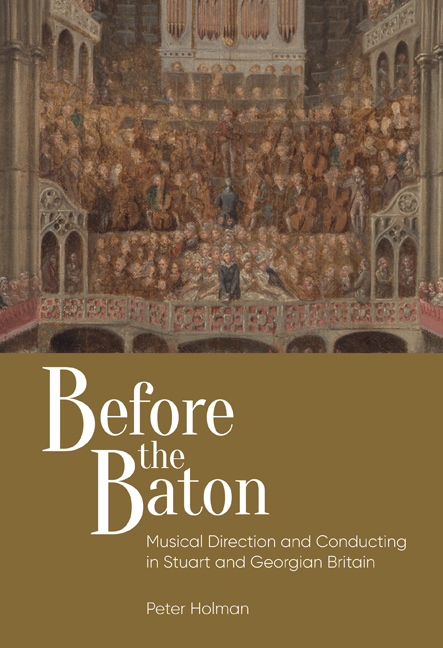Book contents
- Frontmatter
- Dedication
- Contents
- List of Illustrations
- Foreword
- Acknowledgements
- Note to the Reader
- List of Abbreviations
- Prelude To Beat or Not to Beat: The Continental Context
- Part I Directing Choral Music
- Chapter 1 ‘Heard but not Seen’: Leading Anglican Cathedral Music from the Organ
- Chapter 2 ‘With a Scroll of Parchment or Paper, in Hand’: Large- Scale Choral Music
- Chapter 3 ‘Accompanied all along on the Organ by his Own Inimitable Hand’: Handel and the Direction of his Oratorios
- Chapter 4 ‘The Conductor at the Organ’: The Oratorio Tradition after Handel
- Part II Directing Opera and Theatre Music
- Chapter 5 ‘That Ridiculous Custom’: From Devolved Direction to Centralized Time-Beating in Seventeenth-Century Theatre Music
- Chapter 6 ‘Il maestro al cembalo’: Directing Opera and Theatre Music from the Harpsichord
- Chapter 7 ‘A New Discipline and a New Style of Playing’: Directing Opera and Theatre Music from the Violin
- Chapter 8 ‘That Powerful Sovereign, the Conductor’: From the Piano to the Rostrum
- Postlude Superconductors or Semiconductors? Lessons for Today
- Bibliography
- Index
- Miscellaneous Endmatter
Prelude To Beat or Not to Beat: The Continental Context
Published online by Cambridge University Press: 11 September 2020
- Frontmatter
- Dedication
- Contents
- List of Illustrations
- Foreword
- Acknowledgements
- Note to the Reader
- List of Abbreviations
- Prelude To Beat or Not to Beat: The Continental Context
- Part I Directing Choral Music
- Chapter 1 ‘Heard but not Seen’: Leading Anglican Cathedral Music from the Organ
- Chapter 2 ‘With a Scroll of Parchment or Paper, in Hand’: Large- Scale Choral Music
- Chapter 3 ‘Accompanied all along on the Organ by his Own Inimitable Hand’: Handel and the Direction of his Oratorios
- Chapter 4 ‘The Conductor at the Organ’: The Oratorio Tradition after Handel
- Part II Directing Opera and Theatre Music
- Chapter 5 ‘That Ridiculous Custom’: From Devolved Direction to Centralized Time-Beating in Seventeenth-Century Theatre Music
- Chapter 6 ‘Il maestro al cembalo’: Directing Opera and Theatre Music from the Harpsichord
- Chapter 7 ‘A New Discipline and a New Style of Playing’: Directing Opera and Theatre Music from the Violin
- Chapter 8 ‘That Powerful Sovereign, the Conductor’: From the Piano to the Rostrum
- Postlude Superconductors or Semiconductors? Lessons for Today
- Bibliography
- Index
- Miscellaneous Endmatter
Summary
HISTORIES of conducting sometimes start in all seriousness with an extraordinary event, a performance by 800 musicians during the Olympic games at Corinth in 709 BC. The 800, playing instruments of all types, were supposedly conducted by Pherekydes of Patrae, the ‘giver of the rhythm’, ‘placed on a high seat, waving a golden staff’. Needless to say, the ultimate source of this information, an article published in 1824 by Adolf Bernhard Marx, is an elaborate hoax in the form of a pseudo-scholarly article reporting on the discovery of ancient metal scrolls, with an edition of their supposed contents. Marx clearly devised it to show that the symphony orchestra of his time and its baton conductor had been prefigured in ancient Greece; according to Mark Evan Bonds, the first person to realise the article was a hoax and to identify the culprit, it exemplifies ‘the inclination of early nineteenth-century Germans to identify themselves with the ancient Greeks’, which ‘played a key role in the formation of their national identity’. Marx was an influential writer on music, interested in the revival of the music of J.S. Bach and Handel, and was involved with Mendelssohn and his performance of Bach's St Matthew Passion in 1829 (Ch. 8).
This cautionary tale has several important lessons for anyone interested in the history of conducting. First, the subject has received remarkably little scholarly attention, so we need to be even more careful than usual about taking the information in the secondary literature at face value. For example, its best-known ‘fact’, the circumstances of Jean-Baptiste Lully's death, is misleading at best as told even in supposedly scholarly books, as we shall see. A particular problem is that most writers on the subject have been concerned with other things: the literature divides into practical treatises with a little – mostly highly inaccurate – historical context, and histories of the orchestra concerned only peripherally with conducting. Unfortunately, the only large-scale treatment of both aspects, Elliott Galkin's History of Orchestral Conducting in Theory and Practice, is bedevilled by an uncritical approach to sources, by frequent errors of translation, by a lack of relevant context and by too great a reliance on eighteenth-century German treatises.
- Type
- Chapter
- Information
- Before the BatonMusical Direction and Conducting in Stuart and Georgian Britain, pp. 1 - 40Publisher: Boydell & BrewerPrint publication year: 2020

